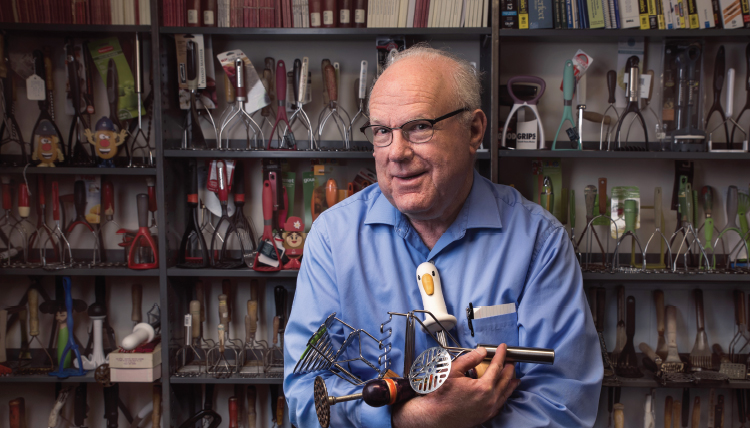A Perfect Mash

By Sidnee Grubb ('18)
There are certain everyday objects one takes for granted. Tissue boxes, bike pedals, bobby pins. They serve their purpose and we may appreciate them, but seldom do we marvel. Professor John Wagner marvels at and collects potato mashers. Why? A reasonable question to ask in a room lined with hundreds of potato mashers neatly arranged on bookshelves.
Wagner’s response is honest: “I’m not sure if I can tell you why potato mashers, but I can tell you why there’s a collection.”
Wagner, who has taught philosophy here for more than 35 years, has Asperger syndrome, a condition that is part of the broader family of autism disorders.
“There are different parts to autism,” he explains. “The part of it which causes most of us to have unusually intense and extremely narrow interests is the best part. I can completely lose self consciousness and get totally involved in the narrow interest. What looks eccentric from the outside is wonderful from the inside.”
His fascination with potato mashers was inspired by another collector he read about, and has been fed by garage sales, eBay and the occasional gift. Mashers are relatively easy to collect and come in all shapes and sizes.
With 600+ potato mashers comes a wisdom about masher preferences. He says it’s all about grip. He enjoys one particular masher that has a middle set of bars that take advantage of the circular motion of mashing, or one that with the flick of a switch springs out into a whisk.
“Collecting potato mashers isn’t about acquisition, pursuit or the feeling of competitive drive to have the most, best or biggest potato masher collection,” Wagner says. “It’s about the human ability to notice difference, distinction and in some regard, beauty in minutiae.”
Now for the Big Question: Are mashed potatoes really better than fries?

